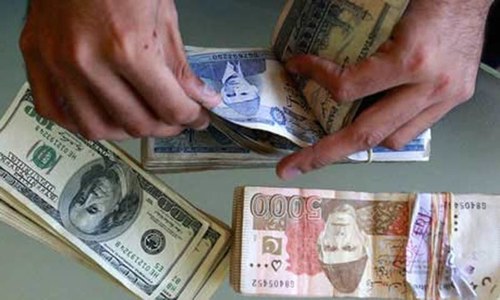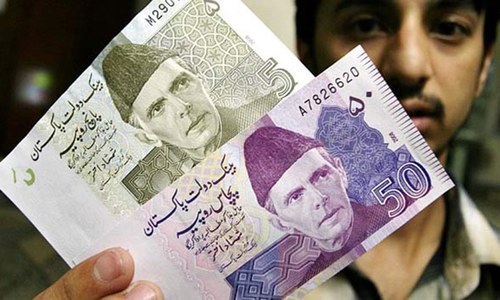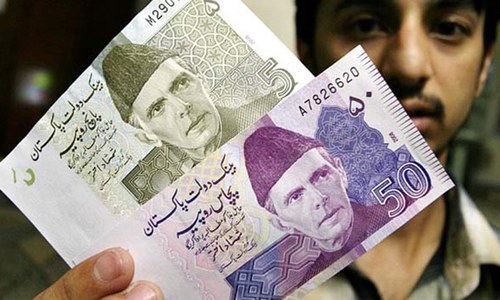
ON Friday, the State Bank launched what appeared to the rest of us like an ambush. All of a sudden, in morning trade, the supports that have propped up the rupee vanished, and the currency plunged in the opening hours of trade, to touch 109.50 to a dollar before finally closing at 107. The opening rate was 105.50, and considering the rupee is traded on fraction, this was a considerable hit.
Here is what the central bank said: “The continuation of high growth in imports led to a widening of current account deficit, and consequently to depletion in the country’s foreign exchange reserves. These pressures have persisted leading to the adjustment in interbank exchange rate. This movement in the exchange rate is based on demand and supply of foreign exchange in the interbank market.”
Translation: we have been importing far more than we are exporting, and foreign exchange has been flying out of the country at an accelerating rate as we make payments on stuff we really cannot afford. Eventually, this had to give, and a cheapening of the currency has become inevitable.
The State Bank governor cannot afford to blind himself to reality. That is exactly the lesson being learnt here.
Not only that, the State Bank went on to say: “SBP is of the view that this market-driven adjustment in the exchange rate will contain the imbalance in the external account and sustain higher growth trajectory. The exchange rate will continue to reflect the demand and supply conditions.”
Translation: hopefully this will help, but its each to his own for a while now, so best of luck folks!
The déjà-vu comes in if you recall what happened on July 5 of this year. On that day too, an ambush of the same sort happened, and the supports on the rupee disappeared suddenly one morning. By the end of the day, as market players lay battered and bruised by the ensuing volatility, the State Bank came out with a press release that began as sombrely as this last one did by noting that the rupee just fell from 104.90 to the dollar at the start of trade to 108.25 by close, a decline of 3.1 per cent.
After taking the customary bow before the “high real GDP growth” and all that sort of stuff, it blithely noted that “the deficit in the external account has been rising for some time”.
“Accordingly, the exchange rate adjusted in the market and SBP is of the view that this depreciation in the exchange rate will address the emerging imbalance in the external account and strengthen the growth prospects of the country.”
Note the almost identical language following an almost identical event. But at that time Ishaq Dar was the finance minister and he was having none of it. A memorable outburst followed, in which the minister described the depreciation as “artificial”, highlighted all of his achievements in bringing in the requisite amount of dollars, dropped hints of a conspiracy against his government, angrily blamed the State Bank for the whole affair, ordered an inquiry, and summoned the heads of all banks to an emergency meeting in Islamabad the very next day.
To cut a long story short, that meeting took place, a visibly shaken and somewhat chastened Ishaq Dar emerged from it before the assembled press corps, and said, well, maybe, just perhaps, it wasn’t a conspiracy after all, perhaps just a case of “miscommunication” between two individuals.
Nevertheless, he went on, straightening his composure, some changes are going to be made, an inquiry into this affair will be conducted, and he assured the markets that no such thing will happen again. The principal change he announced was the appointment of a new, full-time State Bank governor, a position that was filled in an acting capacity by a career central bank staffer until then, since the old governor’s term in office, as well as his dreams of an extension, had ended a little more than two months earlier.
The new governor was named the very next day, and not surprisingly, it was a Dar confidante, Mr Tariq Bajwa. Unlike his two predecessors, Bajwa enjoyed a solid reputation as a competent professional, built up during his tenure as chairman of the FBR. But now, he stepped into a position that nothing in his career would have prepared him for.
As State Bank governor, one has to operate as an outsider to Islamabad, something that is alien to the DMG officer tasked with the job now. One has to ensure that the State Bank’s assessments of the economy adhere to the facts, and to basic economic common sense, even if the bosses in Islamabad do not want to hear any of it. One has to face the markets, which are impervious to political entreaties, and cannot be dictated to like the bureaucracy. In short, the State Bank governor cannot afford to blind himself to reality.
That is exactly the lesson being learnt here. In the intervening months, between July 5 and Dec 8, there has been not a squeak out of the State Bank that pressures building up on the external account could have ramifications for the exchange rate. Then, on the very day Mr Bajwa is in Islamabad, meeting with the IMF as part of its post-programme monitoring talks, the supports from under the rupee vanish, and we are to believe the State Bank suddenly awakens to the fact that a “continuation of high growth in imports led to a widening of current account deficit” and as a result the rupee might need to be adjusted?
The right decision has been made. But if they want us to believe that they took the decision entirely on their own, without any prodding, well then they have a tough sell ahead of them. The exchange rate left behind by Mr Dar did not last the year. Let’s hope the new reality we are entering into can carry us at least till the formation of a new government.
The writer is a member of staff.
khurram.husain@gmail.com
Twitter: @khurramhusain
Published in Dawn, December 14th, 2017












































